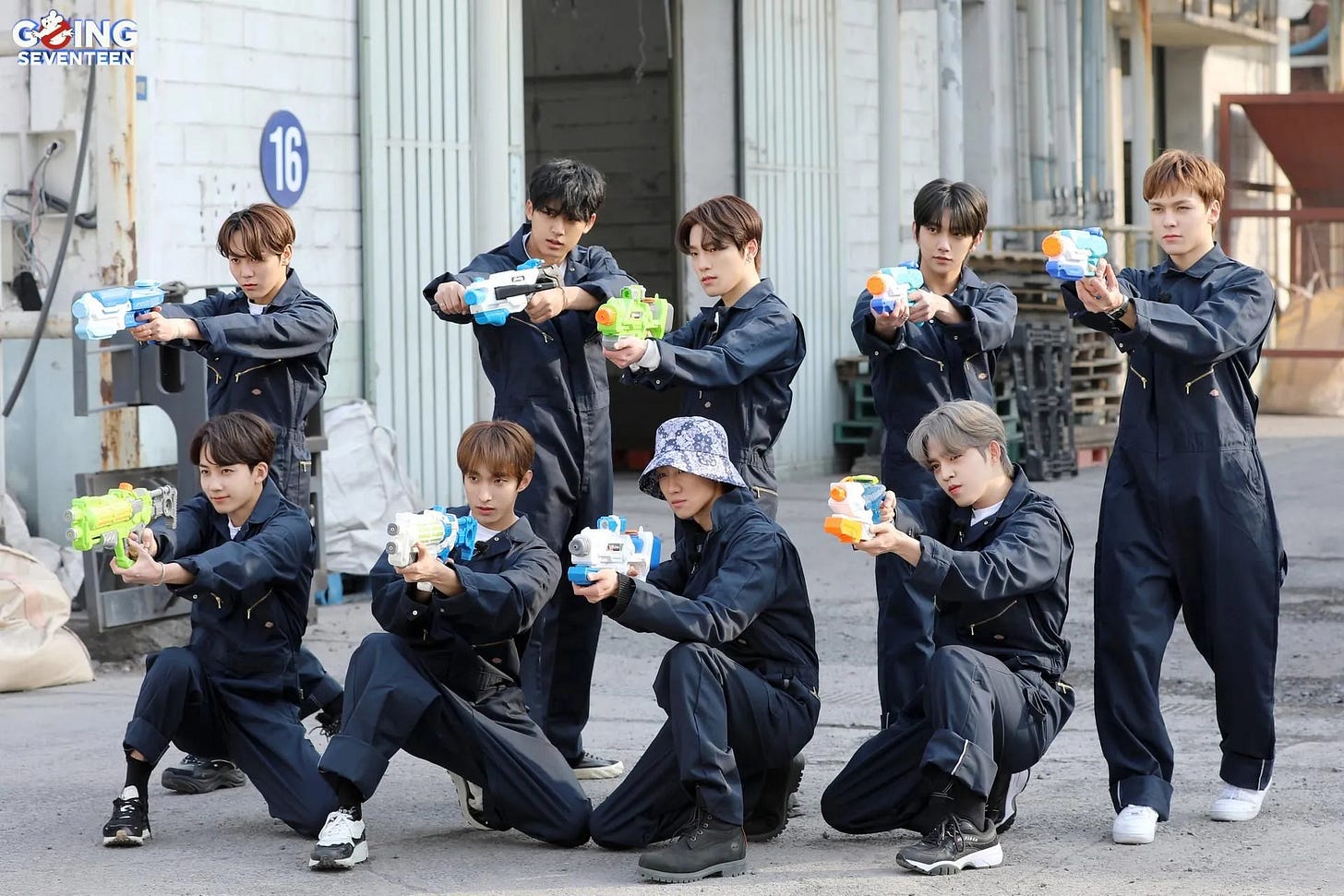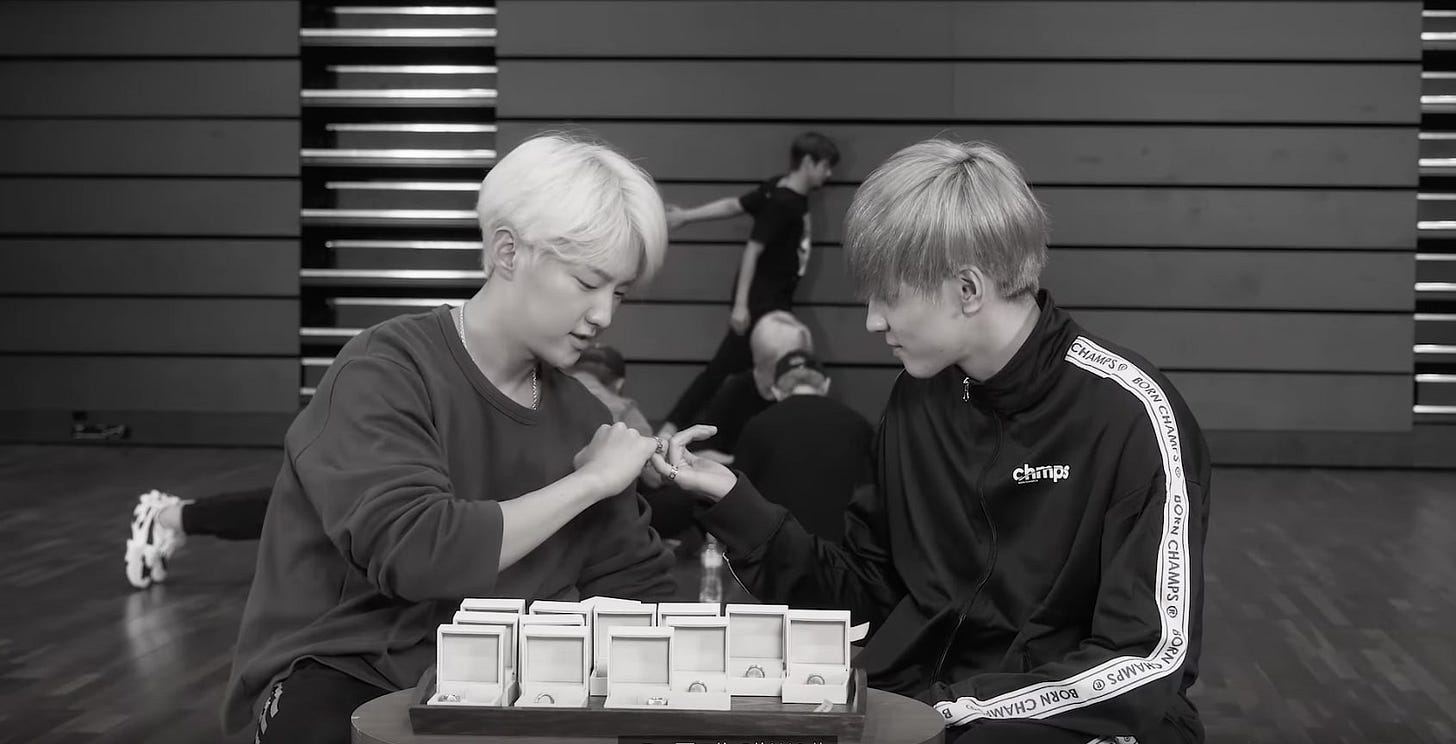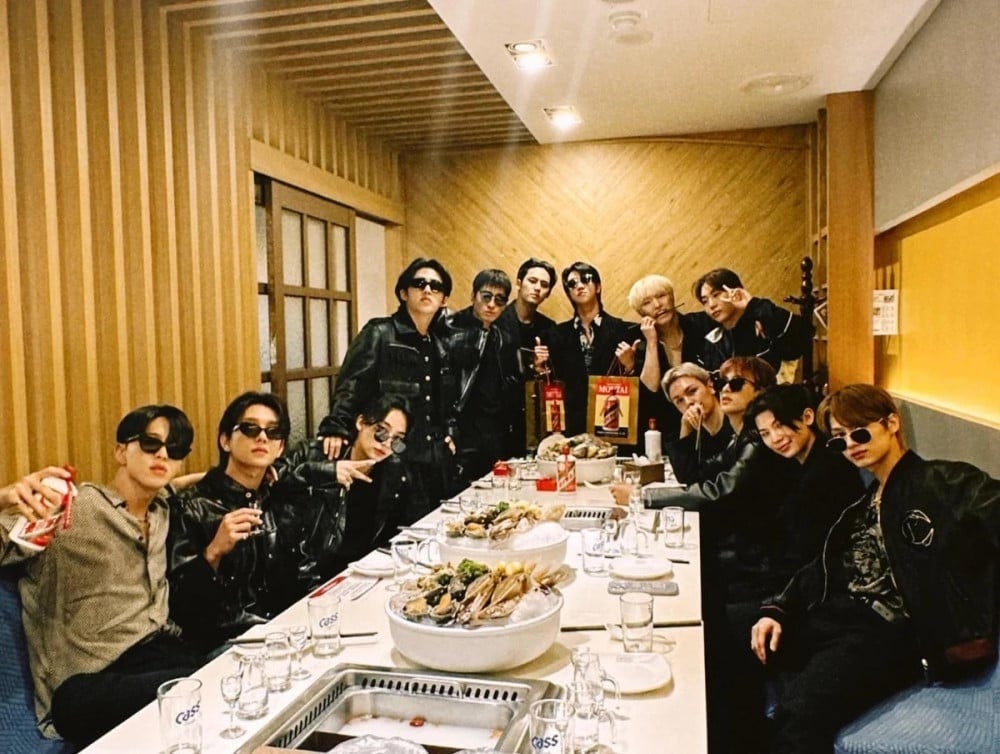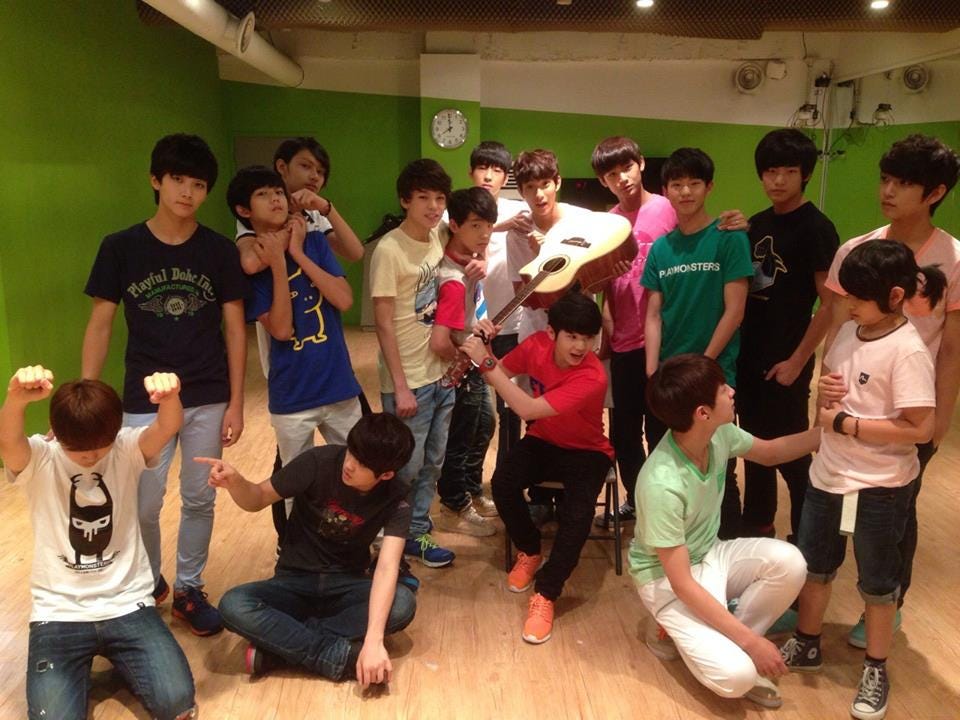Special Issue: Reality Monsters
What Neiyu Fans Need, Seen Through SEVENTEEN: A Case Study (Part 2)
Hi there. Welcome to the Summer Specials of Active Faults.
Today, we will continue to explore the demands of neiyu fans, and therefore what neiyu often fails to supply, through the case study of the K-Pop group SEVENTEEN. Sure, the group’s initial lure of a delightfully heterogenous discography, eye-catching performances, respectable work ethic and a motivational backstory will attract many to become a fan.
But how SEVENTEEN really kept fans hooked is through their off-stage presence.
This issue will show you how in order to become a popular idol, you’ll have to not be an idol at all.
Earth’s Show
It might sound redundant, but it needs to be said that SEVENTEEN are true entertainers.
Like, seriously. The 2020 and 2021 run of their insanely popular group reality show, Going Seventeen, accumulated over 200 million views on Bilibili alone, averaging 3~4 million views on every episode. A fan-made compilation has over 1 million danmu (on-screen comments synchronised to the videos). “GoSe” is nicknamed 地球球综, “Earth’s representative reality show” in China, to describe its consumability and astounding reach far beyond the fans of the group. They’re fun to watch even for your general netizens who know nothing about K-Pop or the idol industry.
The unusually large size of the group with 13 members was no longer a downside but a strong suit when filming GoSe: they were able to do reality on a whole other scale.
They went to an unpopulated island (not a metaphor) for a scavenger hunt. They rented out warehouses to play a Ghostbusters-inspired Running-Man styled hide and seek. They found deserted buildings for rounds of tag in a haunted house set-up. Carefully designed games were played on a baseball pitch, in stadiums and on rice fields (yes, they went farming at one point). Some episodes were so innovative it became its own sub-series like new offshoots on a tree branch, recurring throughout multiple seasons. The variety of content is captivating.
Meanwhile, the editors and screenwriters pull heavy weights to craft increasingly ornate spectacles, the production quality of which so high they well exceed one’s expectation of an idol group’s self-made reality programme. A personal favourite is their horror special entitled “Ego”, where members play a multi-storeyed room escape with a dystopian thriller plotline involving clones, while being stuck in a Groundhog Day-ish timeloop. The narrative, dramatic tension and camera language was cinematic from start to finish.
The creativity of the production team and the members’ dedication forged the lovechild that is GoSe. An episode like “Ego” wouldn’t succeed without everyone’s committed participation in playing their part, piecing together the story and solving the puzzles. Like their concerts, SEVENTEEN put in 120% of their efforts and catapult themselves into reality shows with a passion. They thoroughly enjoy doing sustained roleplays, dress-ups and impromptu skits like being entertainers is their day job. In fact, they’re known in K-Pop as unofficial gagmen who are compulsive about being funny. They’re “reality-trained monsters” who would do anything to crack a joke.
And they are hilarious as f*ck.
Their fixation on landing a peak comedy moment out of every reality programme they go on has led to what fans describe as their “broadcast alter egos” with “mildly unhinged” behaviours. They unapologetically and relentlessly cheat in games, bend and renegotiate the rules halfway through filming, place irrational bets to raise the stakes, lie and invent new caveats. In a GoSe episode of a mind game like “mafia”, everyone could be a double or triple agent. On other occasions, they deliberately go overboard with their goofiness to get a laugh, be it doing the ice bucket challenge out of nowhere or painting their eyebrows using ketchup. If they’re about to lose a game, they’d still try giving it a go and spin it positively. For them, the ultimate goal is not winning but causing uproariousness and hilarity. That makes their content upbeat, unpredictable and exhilarating at every turn.
Group Spirit
One of the rising gagman in the group, JOSHUA, said that his ease at being silly on camera comes from a deeply rooted sense of security: my members will always be my hype men and have his back.
Carats have said that no one would ever love SEVENTEEN as much as SEVENTEEN do. Exhibit A: Their group rings that they promised to keep on until they die. It’s a debut gift from the company as a symbol of their companionship. With every release of a full-length album, they would receive a new one for the next leg of their journey as a group.
In 2021, SEVENTEEN became the first, largest and only multi-national K-Pop group to have completed a fullhouse contract renewal. All 13 members chose to stay with the team despite having personal ambitions and goals. The whole process took over 9 months involving numerous negotiations with the company. They said it was a pedantic and arduous task for everyone, having to be almost rudely pragmatic about money with your dearest friends. They’ve had difficult conversations on salary ratios. They’ve come clean about their existential doubts regarding idol as a lifelong path. Throughout the contract renewal process, some members like MINGYU took the lead in initiating and encouraging the discussions even when it becomes too heavy. He cheered everyone on with his positive mindset and reminded the group of their bottom line: they love each other and want to continue working together. All of them also reached a consensus to defy an unspoken rule and enter the renewal meetings as a group instead of individually, thereby avoiding any kind of manipulation of their words and misunderstandings between members.
It was a battle and the successful renewal at the end was hard-won. It goes to confirm what DINO said, that, although a chunk of their success comes down to luck, there’s one thing that’s never about being at the right place at the right time. It’s their teamwork, and it’s so much more than producing albums or exchanging symbolic rings. It’s in the grind of compromising and effectively communicating. It’s making an effort off the camera and looking out for others.
That’s the last straw for neiyu fans to succumb to Carat-ism: robust emotional bonds between members that fossilised into “团魂”, group spirit. It’s a rarity in neiyu, because idol groups are systematically prevented from forming one. They don’t have to train and cohabit with other future members for an extended amount of time. Xuanxiu only made matters worse, because the group that came about by the end is filled with contestants competing with each other mere hours before. Their fans are solo stans from square 1 and won’t easily become fond of the group. It is no wonder that the verb that often precedes 团魂 is “f*ck” (操). 操团魂 refers to an awkward demonstration of group camaraderie that’s obviously forced. Fascinatingly, what “f*ck” really means here is a metaphorical rape. It’s a two-way assault to brutally force intimacy onto the idols and the synthetic group spirit onto the fans.
Speaking of communication and intimacy: SEVENTEEN love loud. I meant this in a Yes, They Are Noisy Pranksters way but also in a way that they verbalise affection for each other. They wear their attachment-issue-free hearts on their sleeves, always outright with words of affirmation and never hesitant to be vulnerable.
It's evident everywhere. They compliment each other all the time, hold hands and hug and soothes. Despite living and working together, they commit to showing up to a designated group dinner every month, where they hang out with each other as non-idol individuals. Each member alternate as the host who decides on a theme (to play dress-up) and restaurant. These dinners are kept so private and intimate that photos are rarely taken and fans only get snippets of information about them.
Their conflict-resolving procedures are textbook. An instance from their old vlogs stand out the most. The members, split into two teams of the older and the younger, got too invested in the game they played. One of the younger members snapped when they lost. Despite being angry on the spot, S.COUPS, the leader and the eldest, held back from lashing out and simply wrapped the filming. Later, the “older brothers” including S.COUPS, JEONGHAN and JOSHUA decided aside that the group needs to talk. “We shouldn’t leave it at that,” JEONGHAN said, before inviting the members together and opening up a conversation. Apologies, explanations and resolution ensued. Watch the full clip to join me in my awe. They’re actually so good at resolving conflicts they couldn’t act out a fake fight convincing enough to prank some members.
They regularly have deep conversations that often bring tears to fans’ eyes. They appeared on “In The Soop” in 2021 and 2022, a lifestyle reality programme where the members live in a forest cabin for a week to unwind and recharge. So many beautifully tender moments were caught on camera as they took the opportunity to (re)connect with each other. They collectively reflected on the toll the pandemic took on them, their mental health, their outlooks on life and their relationships with the fans over shots and shots of soju. SEUNGKWAN was one of the members experiencing a burnout phase back then. Although others caught on and felt concerned, they were all biding for an appropriate occasion to approach him. JOSHUA found him one evening and began like this:
You make me smile every time I look at you…So I look at you a lot, and when you feel down, I’ll be able to tell…Recently [pauses] you’re tired, right? You don’t have to tell me. I know. You can tell me when you’re ready.
After his eventual confession, JOSHUA proceeded to tell him that it’s okay to feel and express exhaustion, they are a team and they will cover for him whenever needed. They cried, hugged and promised to be each other’s support. It was an unbelievably healthy interaction.
That’s why, I think, SEVENTEEN became as big as it is now: people need mental health role models. Fans want to know that mature communication can and does exist. To watch them love openly and expose the ugliness of feelings without the inhibitions of being an idol is liberating.
Out of Melona Jail
SEVENTEEN are able to lose every last shred of their pristine idol persona on reality shows because they grew up with cameras and nothing to lose. Back when they were stuck in “Melona Jail”, their practice room in the basement with hideous green walls like the Korean popsicle Melona, their teenage selves were often livestreamed like Truman to a handful of early-day fans.
The company set up what members dubbed as a “CCTV camera” to showcase their daily practices and document their preparation for, hopefully, future success. On their ways to become an idol but not quite bearing the burden of it yet, the boys appeared on camera cautiously but candidly. In addition to singing and dancing, they were also trained to become comfortable with each other’s company despite watchful eyes, wrestling like animal cubs for the world to see. The CCTV camera is a disconcerting initiative to say the least, but it somehow desensitised them and chiselled out an onscreen identity where professionalism meets natural charisma. To this day, they’ve instinctually retained that joviality and openheartedness from the Melona era.
This is most visible from “TTT”, a sub-series of GoSe featuring members going on a “MT” or membership training. Traditionally hosted in South Korean universities, a MT is a teambuilding outing with a lot of food, alcohol and ice-breaking games. Not that SEVENTEEN needed to break any ice, but TTT has always been so loved by Chinese carats because it strips away their idolness. Without professional hair, makeup and styling, the members film TTT as if the cameras are not there at all. They play, cook, eat and drink like they’re just your friend group at university, getting together for a weekend trip away. TTT lay bare their chaotic, genuine selves and their banters. Their drunkenness, messiness, and randomness as the flipside to their Quixotism. This creates a different kind of illusion than the one their idol selves are taught to carve out: that they are real and close by, maybe even tangible to touch. They are like you and me.
A tangible perfection is irresistible.






